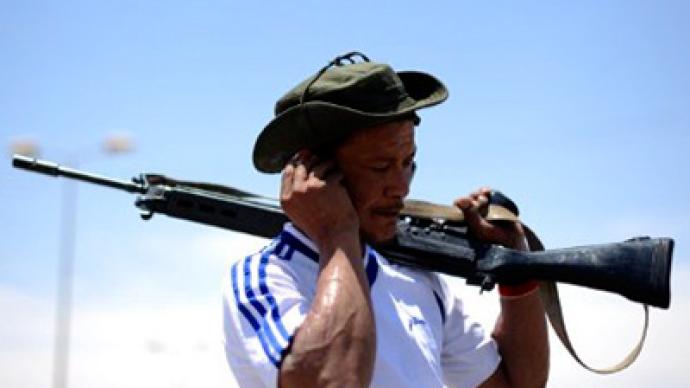As civilian deaths in Libya grow, anger mounts among the Western taxpayers footing the bill for the military intervention. The conflict is expected to cost one of its key players, the UK, hundreds of millions of pounds.
Britons are already calling it the “billion-pound war”. It is calculated that if the military campaign in Libya goes on for six months, it will cost the British taxpayer US$1.6 billion. But that initial “humanitarian mission” is now a “get-rid-of-Gaddafi” operation – and that could take a lot longer.“Assuming their goal is simply to oust him from power, one imagines this is not going to end until he is killed or leaves office, so this could potentially drag on for months more. And as we see, they’ve already extended the operation by another three months,” journalist James Corbett said.That is unlikely to be popular with a British public that is watching government spending like a hawk right now – already furious at seeing services and jobs slashed. Even so, Downing Street’s war wallet is open, and it is taking the lead in Libya.Data gathered by Britain’s Guardian newspaper from defense ministries and news reports shows that Britain has flown 25 per cent of all sorties in Libya, second only to the US. By the second week of May, 6,000 strike missions had been ordered.Blogger Daniel Renwick says the UK is likely to have weighed up the cost. But with a warm wind blowing westwards from Libyan rebels and youth movements, Britain reckons a billion pounds is a pretty good investment. “It’s about having control of North Africa’s resources, particularly Libya’s crude oil, which is easily accessible. Sales have already started to be made through the transitional council,” he told RT.Some bombs cost up to $1.5 million dollars each, and with the UK cutting defense spending, it seems unlikely they will be replaced. And when you’re dealing with such big numbers, small things make a big difference. “The Eurofighter Typhoon [aircraft] costs 90,000 pounds an hour [to operate], so small changes in the number of hours you estimate produce big changes in cost estimates. I would go for the upper end,” Shank Joshi from the Royal United Services Institute said.Wars are always expensive, but the costs back home could prove more difficult to afford. Next in line to strike are a million public sector workers, who are being asked to work more and get less. The disruption to services could run into weeks.The commitment to continue in Libya for however long suggests a blank check at a time when there is little in the kitty. The deployment of Apache helicopters does not appear to have given NATO the tactical advantage it hoped for; and every time a plane takes to the sky or drops a bomb, the cost for Britain and its beleaguered European neighbors creeps higher and higher.
Michael Maloof, a former Pentagon official, told RT the only progress NATO is making so far is inflicting more collateral damage, while Gaddafi’s forces still have the capability to fight.The US is now involved in four military operations in Muslim countries: Afghanistan, Iraq, Yemen and now Libya as well, “the question is what we are trying to accomplish as a nation from a geo-strategic standpoint – and that confuses the American people.” He particularly noted that the case of Syria differs a lot from the operation in Libya because if the US is going to support Saudi Arabia, which is trying to unsettle President Bashar al-Assad’s regime in Syria because of its close ties with Iran and its proxies Hamas and Hezbollah, then America has to be prepared for a direct conflict with Russia and its geo-political interests in the region, because Russia has a naval base Tartus in Syria.


